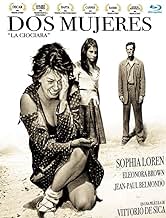La ciociara
- 1960
- Tous publics
- 1h 41min
Dans l'Italie de la Seconde Guerre mondiale, une veuve et sa fille esseulée cherchent à prendre de la distance loin des horreurs de la guerre.Dans l'Italie de la Seconde Guerre mondiale, une veuve et sa fille esseulée cherchent à prendre de la distance loin des horreurs de la guerre.Dans l'Italie de la Seconde Guerre mondiale, une veuve et sa fille esseulée cherchent à prendre de la distance loin des horreurs de la guerre.
- Réalisation
- Scénario
- Casting principal
- Récompensé par 1 Oscar
- 11 victoires et 3 nominations au total
- Michele Di Libero
- (as Jean Paul Belmondo)
Avis à la une
Seen at home, in Toronto, on February 19th, 2006.
81/100 (***)
The woman is Sophia Loren, and she won the first ever Oscar given for a foreign language performance in this film. She plays Cesira, a spitfire who is blithely indifferent to Italy's role in the war until the horrors of it hit home in deeply personal ways when she and her daughter leave bomb-addled Rome to trek across the Italian countryside to wait out the fighting. Most WWII films are told from the point of view of the men in combat or the women who wait at home patiently for them, letting their commitment to the cause be their solace. Few films are told from the point of view of women on the wrong side of the conflict (as we've been taught) who don't much care who wins or loses as long as their lives are left untouched. One would be justified in thinking that Loren's character is either selfish or naive, or both, but one would have to be inhuman not to feel compassion for what happens to her and her daughter.
Loren was known as nothing but a sex kitten at the time of this film's release, and director Vittorio De Sica uses this to his advantage. Her Cesira is a woman who's used to being alluring to men and isn't above wielding her sexuality when it might work to her advantage. But Loren goes far beyond sex kitten in this film, to something nuanced and ultimately heartbreaking.
Grade: A
Like many European films of its time, Two Women is all about the characters and the current on which they flow through the film, a realistic capsule of a time and place. Vittorio De Sica, who made the beautifully small-scale film The Bicycle Thief, which is about a relationship between father and son, forms a companion piece with Two Women, which is about a relationship between mother and daughter. He addresses strikingly the unbearable love between a parent and their child.
Truly one of the greatest Italian films, this is an absorbing, emotional, modest journey with wonderful music; coarse, down-to-earth cinematography from the wonderful old days of gritty film prints and old school hands-on editing; incredible acting not only from Loren but from the young actress playing her daughter, who drastically transforms; and also from Jean- Paul Belmondo, who convincingly plays completely against type; and a beautifully emotional final shot. For those who feel detached from older foreign films, especially neo-realist, I have yet to see an Italian neo-realist film any more alive than this one!
That being said,I realized how much we lose by prejudging film, and actors by their more recent performances. As Sophia Loren was popular before my time, I remember her from fluff and spy movies such as "Arabesque" with Gregory Peck. A forgettable film, at most. Not so for "Two Women".
The performance of her innocent daughter Rosetta, is also marked and memorable. Refugees from the bombing of Rome during World War II, Sophia Loren as Cesira, and her daughter are fleeing the city, come across relatives in the country, and encounter a harrowing fate.
The feel of the film is palpable and stark, the scene and the shadows of the men as they come across these two women in the effigy of a church, is ominous and effective. The expressions and body language of Loren are heart-rending and sorrowful, as we see her realize what has become of her daughter, what has become of their world. The scene I will remember most is where she is finally rescued, her daughter begins to sing, recovering from the attack. Cesira (Loren) turns her face outward, toward the window, ravaged and ruined, yet finding some strength to continue on. We see a multitude of emotions cross her face without uttering one word.
Truly a film not to be missed for Sophia Loren's performance alone. 9/10.
Le saviez-vous
- AnecdotesSophia Loren claims that Director Vittorio De Sica, so caught up in the story, regularly cried on the set when filming particularly emotional scenes.
- GaffesNear the beginning, Cesira and Rosetta choose to walk rather than wait aboard their stranded train. However, they set off in the opposite direction to the train's destination.
- Citations
[subtitled version]
Cesira: Do you know what they have done those "heroes" that you command? Do you know what your great soldiers have done in a holy church under the eyes of the Madonna? Do you know?
American Soldier: Peace, peace.
Cesira: Yes, peace, beautiful peace! You ruined my little daughter forever! Now she's worse than dead. No, I'm not mad, I'm not mad! Look at her! And tell me if I am mad! Rotten crazy bastards!
- ConnexionsEdited into Al Centro del cinema (2015)
Meilleurs choix
Détails
- Date de sortie
- Pays d’origine
- Langues
- Aussi connu sous le nom de
- La paysanne aux pieds nus
- Lieux de tournage
- Chiesa San Francesco d'Assisi, Fondi, Lazio, Italie(interiors: rape scene in the church)
- Sociétés de production
- Voir plus de crédits d'entreprise sur IMDbPro
Box-office
- Montant brut mondial
- 14 062 $US
- Durée
- 1h 41min(101 min)
- Couleur
- Mixage
- Rapport de forme
- 1.66 : 1






























